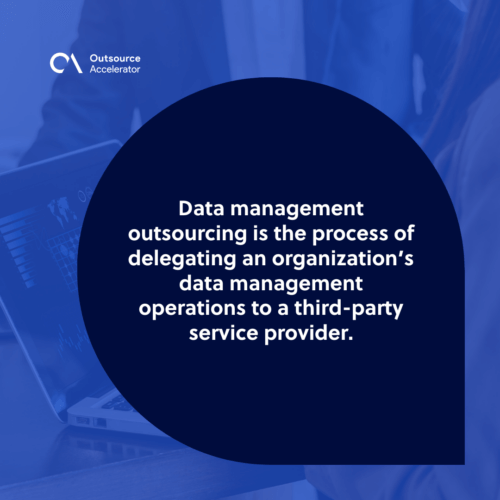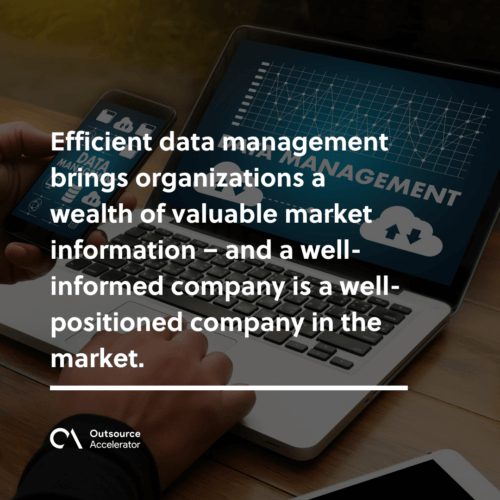How businesses can benefit from data management outsourcing

Many companies from various industries have increasingly relied on data for their business processes.
There are roughly 2.5 quintillions (2.5 followed by 18 zeroes) bytes of data created daily worldwide. Data management can quickly become overwhelming for businesses that rely on them for market advantage.
When data traffic overload renders a company’s data management processes immobile, data becomes worthless as they aren’t utilized for revenue-boosting activities.
Thus, many companies turn to data management outsourcing to eliminate the potential problems that may arise from the inability to manage data efficiently.
What is data management outsourcing?
Data management outsourcing is the process of delegating an organization’s data management operations to a third-party service provider.
Instead of taking on the daunting task of data gathering, aggregating, storage, or analysis themselves, companies turn to business process outsourcing (BPO) firms like OP360.
These outsourcing firms handle the various data management processes and turn the output over to them, saving time and money for the companies.
By outsourcing this process, businesses gain maximum potential from data with minimum input.

Types of data management systems
Companies manage data in various ways, depending on how they intend to use them.
Businesses may utilize these data to help them make better data-driven decisions. They can also use them to create better marketing strategies that target particular groups of people.
Whatever ways companies may use data, they often use data management systems to ensure maximum efficiency in data utilization.
Below are some examples of data management systems used by many companies.
Customer relationship management (CRM) system
Companies use customer relationship management (CRM) system platforms to facilitate a better connection with their client base.
These software solutions enable more efficient customer data collection and management.
Businesses use CRMs to generate leads and convert them into sales.
They can also rely on CRM platforms to track their customer engagement.
Data warehouse system
Data warehouse systems are digital storage of consolidated data sources.
There are three types of data warehouse systems:
- Enterprise data warehouse (EDW)
- Operational data store (ODS)
- Data mart
Data warehouse systems enable and support gathering business intelligence (BI), particularly analytics.
These data are gathered from various sources, such as transaction applications and log files.
Over time, these systems consolidate massive amounts of data from different sources.
Businesses then use these collected data to improve their decision-making processes.
Marketing technology (MarTech) systems
MarTechs can include different types of platforms that help marketers execute their campaigns and other operations – hence the name marketing technology.
These can range from email service providers, marketing automation platforms, and other technologies that assist in advertising products and services.
MarTechs are typically used together with CRMs as these two systems benefit from each other.
How do businesses benefit from data management outsourcing?
Efficient data management brings organizations a wealth of valuable market information – and a well-informed company is a well-positioned company in the market.
Aside from providing invaluable insights, businesses can gain numerous other benefits from outsourcing data management processes.

These benefits include:
Increased in-house productivity
Delegating data management tasks to an offshoring firm allows a company’s in-house staff to focus on more critical aspects of their jobs.
This workload distribution between offshored and in-house staff brings more efficiency than keeping everything in-house.
Cost-reduction
Outsourcing your data management process is a cost-effective way of reducing in-house employee workloads without sacrificing output quantity and quality.
Aside from cheaper labor (as much as 70% labor cost savings!), businesses also save on equipment and software costs for efficient data management.
Access to premium technology
Offshore firms that offer data management services often possess leading-edge proprietary software that enables more efficient data management.
Considering the licensing fees, maintenance costs, and subscriptions associated with proprietary software, these types of software can be too expensive for small businesses.
Through outsourcing, businesses can bypass these costs and still have access to these premium tools and staff familiar with using them.
Improved data quality
Outsourcing data management processes lets an offshore firm’s team of experienced data management professionals handle the said function.
These experts, combined with the premium tech available to outsourcing firms, are guaranteed to produce data quality better than businesses can achieve independently.
Factors to look for in a data management outsourcing partner
Below are several factors businesses must consider before handing over their data management operations to an outsourcing firm:
Data security measures
Outsourcing data management operations, businesses must prioritize data security, particularly when dealing with sensitive information.
A crucial factor in selecting an outsourcing partner is understanding the safety measures they have implemented to guard against unauthorized access and potential data breaches.
A prime example of a reliable outsourcing partner is Cloudstaff, which stands out for its commitment to data security and confidentiality. This firm employs modern security methods to ensure the integrity and protection of client data.
Data storage
The location where data is stored can significantly impact a company’s operational performance.
Choosing the right outsourcing partner involves considering the data storage solutions they employ and having effective data management practices.
Cloud-based storage, for instance, offers advantages such as enhanced accessibility and facilitates smoother and more efficient data transfer processes.
Evaluating the suitability of an outsourcing firm’s data storage capabilities is essential for businesses seeking optimal performance and seamless data management.
Data management expertise
While many outsourcing companies claim expertise in providing data management outsourcing services, examining the service provider’s track record is imperative to verify its proficiency in data management.
Before entrusting data management operations to an outsourcing partner, businesses should investigate the firm’s past projects and the experiences of its data management team in handling similar tasks.
This thorough examination ensures that the chosen partner possesses the skills and knowledge to manage and manipulate data effectively. This will greatly contribute to the success and efficiency of the outsourcing arrangement.







 Independent
Independent




